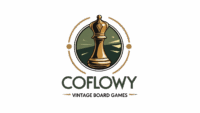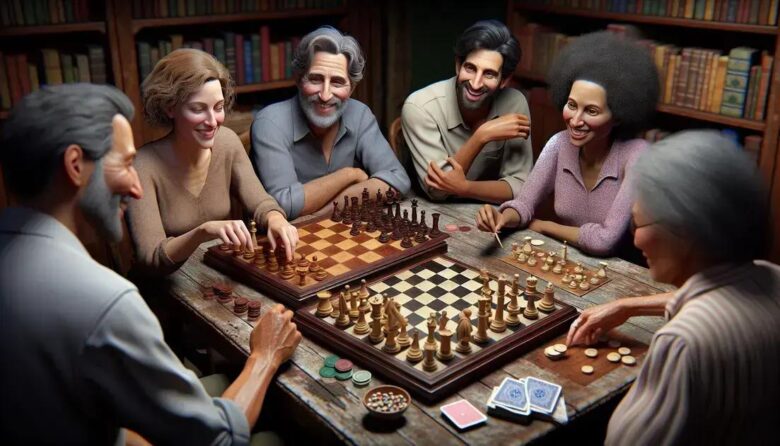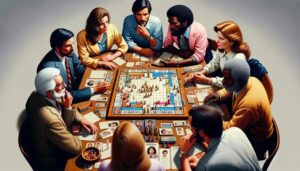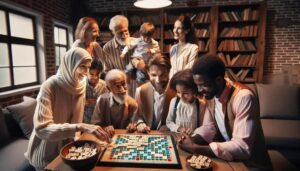Board games that teach critical thinking improve problem-solving, strategic planning, and social skills by engaging players in challenges requiring logic, analysis, and teamwork through classic games like chess, clue, and backgammon.
If you ever wondered how to boost your brain and have fun at the same time, board games that teach critical thinking might be exactly what you need. These classic games slip in problem-solving and strategy without you even noticing—doesn’t that sound like a win-win?
why critical thinking matters in everyday life
Critical thinking is an essential skill that helps us navigate everyday challenges effectively. It allows us to analyze information, weigh options, and make better decisions in both simple and complex situations. Developing strong critical thinking skills can improve your ability to solve problems and understand different perspectives.
In daily life, from deciding what to buy to resolving conflicts, critical thinking plays a vital role. It helps you avoid mistakes caused by assumptions or biases and encourages a more thoughtful approach to challenges. For example, when faced with news or social media claims, critical thinking enables you to evaluate sources and separate facts from opinions.
Moreover, this skill supports better communication and creativity. By thinking critically, you can explain your ideas clearly and come up with innovative solutions. Whether at work, school, or home, critical thinking fosters independence and confidence.
how board games enhance problem-solving skills
Board games require players to plan, strategize, and adapt to changing situations. These activities naturally build problem-solving skills by encouraging players to think ahead and find solutions under pressure. When you play, you learn to weigh risks and rewards, which sharpens your decision-making abilities.
Many board games involve puzzles or challenges that must be solved to progress. For example, games like chess or checkers push you to anticipate your opponent’s moves and develop counter-strategies. This kind of mental exercise improves your ability to analyze problems thoroughly.
Board games often present multiple paths to victory, so players learn to evaluate options critically. This flexibility teaches creativity and the skill to adjust plans when things don’t go as expected. Playing regularly can boost your patience and persistence, two qualities vital for effective problem-solving.
Real-world benefits
Using board games to practice problem-solving also translates to real life. You become better at breaking complex issues into smaller parts and thinking through consequences before acting. These skills help not only in work or school but in daily challenges like managing time or resolving conflicts.
top classic board games for developing critical thinking
Many classic board games are excellent tools for developing critical thinking skills. Games like Chess, Checkers, and Scrabble encourage players to think strategically and plan ahead. Chess, for instance, requires deep foresight and understanding of various possible moves and outcomes.
Another popular game, Clue, builds deductive reasoning as players collect clues to solve a murder mystery. This involves questioning assumptions and piecing together information logically. Similarly, Sudoku challenges pattern recognition and logical sequencing, useful for sharpening focus and analytical thinking.
Backgammon combines chance and strategy, teaching players to make decisions based on probability and risk. Meanwhile, Risk promotes long-term planning and negotiation skills as players aim to control territories strategically. These games engage different aspects of critical thinking, such as problem-solving, analysis, and patience.
Why classic games remain relevant
These games have stood the test of time because they offer deep mental challenges that are accessible and engaging. Playing them regularly can improve your cognitive skills and even boost creativity. Incorporating classic board games into your routine is a simple, enjoyable way to strengthen critical thinking.
strategies to use games for effective learning
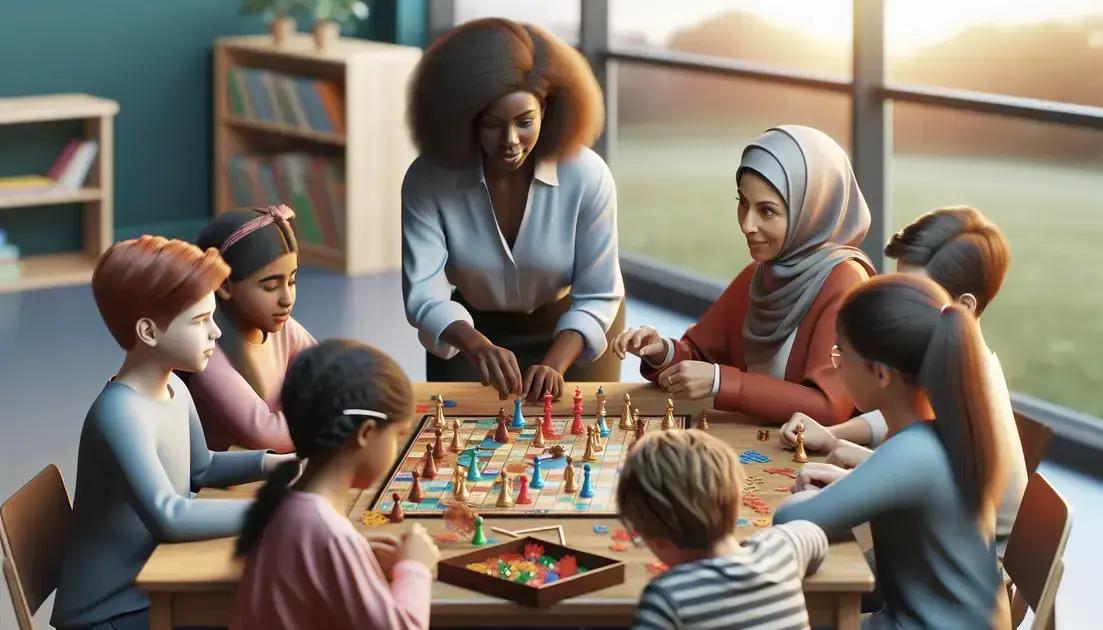
Using board games for effective learning requires intentional strategies that maximize engagement and knowledge retention. Setting clear learning goals before playing helps focus the experience on developing specific skills, such as critical thinking or collaboration. Teachers and parents can guide gameplay by asking questions that encourage reflection and problem-solving.
Another key strategy is to create a supportive environment where players feel comfortable experimenting and making mistakes. This fosters a growth mindset, allowing learners to see challenges as opportunities to improve. Mixing competitive and cooperative games also balances motivation and teamwork.
Incorporate discussion and feedback
After playing, discussing the decisions made during the game can deepen understanding. Encouraging players to explain their thought process promotes metacognition and self-awareness. Constructive feedback helps highlight effective strategies and areas for improvement.
Finally, adapting game complexity to the players’ skill levels keeps the activity challenging yet achievable. Using variations or house rules can customize the experience to different ages and abilities, making learning enjoyable and accessible for all.
benefits beyond the game: social and cognitive gains
Playing board games offers more than just entertainment; it delivers valuable social and cognitive benefits. Socially, games encourage communication, teamwork, and empathy. Players learn to listen, take turns, and respect others’ viewpoints, which strengthens relationships and social skills.
Cognitively, board games boost memory, attention, and logical thinking. Engaging in complex games requires players to remember rules, track actions, and anticipate consequences. This mental workout enhances brain function and helps maintain sharpness over time.
Building emotional intelligence
Board games also teach patience and emotional control. Dealing with winning or losing gracefully builds resilience and the ability to manage frustration. These emotional skills are crucial for personal and professional growth.
The balance of challenge and fun keeps players motivated to learn and think critically. When combined, these social and cognitive gains make board games a powerful tool for both children and adults to develop essential life skills.
tips for choosing the right critical thinking board game
Choosing the right board game to develop critical thinking involves considering several important factors. First, assess the age and skill level of the players to ensure the game is neither too easy nor too complex. Games with adjustable difficulty levels are ideal for accommodating different learners.
Next, consider the type of thinking skills you want to target. Some games focus on strategy and planning, like Chess, while others emphasize logic and deduction, such as Clue or Sudoku. Knowing your goal helps narrow down the options.
Evaluate game mechanics and player interaction
Look for games that encourage active engagement and multiple strategies rather than relying heavily on luck. Games that require discussion or collaboration can also boost social skills alongside critical thinking.
Read reviews and watch gameplay videos to understand if a game fits your needs. Demoing a game before buying can save time and money. Lastly, choosing games that are fun and stimulating ensures consistent play and better learning over time.
incorporating board games into family and classroom routines
Incorporating board games into family and classroom routines can create fun, productive learning moments. To start, set aside regular times for game sessions. This consistency helps build anticipation and makes games a natural part of the day.
Select games that fit the age and interests of players, ensuring everyone stays engaged. Combining educational games with classic favorites can balance learning and relaxation.
Creating a supportive environment
Encourage open communication and teamwork during gameplay. This helps players share ideas and develop social skills. In classrooms, use games as icebreakers or lesson supplements to make learning interactive.
Reflect on gameplay afterward by discussing strategies and lessons learned. This deepens understanding and enhances critical thinking. Whether at home or school, board games can strengthen bonds while boosting cognitive skills.
Bringing it all together
Board games are more than just fun—they help improve critical thinking and problem-solving skills while boosting social abilities. By choosing the right games and making them part of your family or classroom routines, you create meaningful opportunities for learning and connection.
Playing games regularly can sharpen the mind, encourage teamwork, and make learning enjoyable. Whether you are a parent, teacher, or game lover, embracing these classic games can support growth in many important areas.
So, start exploring the world of critical thinking board games today and watch how they make a positive impact on your daily life and learning experience.
